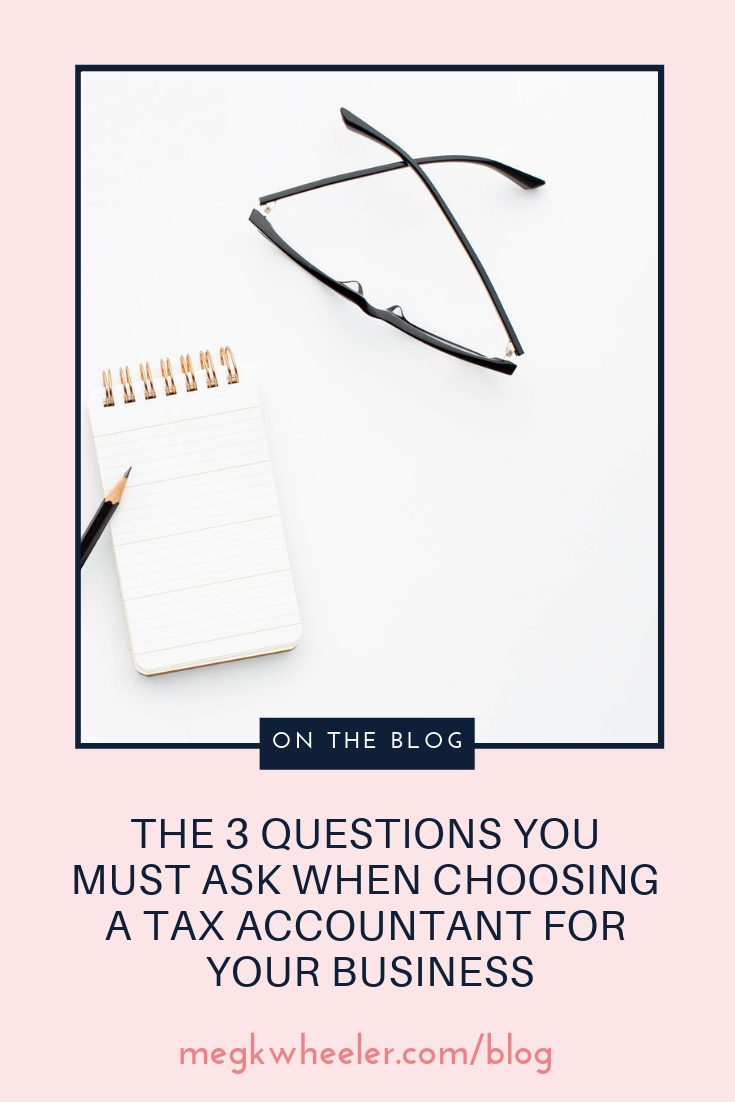The 3 Questions You Must Ask When Choosing a Tax Accountant For Your Business

No matter the size of your business or the amount of revenues, knowing how to choose a tax accountant is key. A good tax accountant will not only ensure your business’ tax filings are done correctly and on time, but they will also provide valuable strategic planning advice. Moreover, they’ll guide you as you make decisions in your business that could have undue tax consequences. The right tax accountant will save you time and money and ensure that your business’ tax house is well in order.
However, finding the right accountant can feel like a daunting task. From the guy who’s hung out a shingle to the large, national firms, there are endless options. How can you know which one is the right fit for your business?
In my experience, by asking the 3 following questions, you’ll ensure you get the right person, with the right resources, for your business’ model and needs. Failing to ask these questions can lead to countless hours and dollars wasted with someone who doesn’t understand your business or its industry and fails to provide valuable strategic guidance.
Accountant vs. CPA
Before we dive into the 3 must-ask questions, let’s make sure we’re on the same page with our terminology.
Bookkeeper
A bookkeeper records and classifies a company’s financial transactions (sales, expenses, etc.). Their focus is on accurate record-keeping and not on the analysis or strategic planning of the financials. A bookkeeper typically has at least a high school diploma. Although, most have at least an associate’s degree in bookkeeping or accounting as well.
Accountant
The literal definition of an accountant is “a person whose job is to keep financial accounts”. However, as this sounds pretty similar to the role of a bookkeeper, let’s clarify that. An accountant’s job usually begins where a bookkeeper’s ends. An accountant takes the data from a company’s financial accounts and analyzes, reviews, and interprets it. Often times their job entails turning this data into reports that can be used for decision making. An accountant typically holds a 4-year bachelor’s degree (at least) in accounting.
Tax Accountant
This one’s pretty simple – a tax accountant is an accountant who specializes in taxation.
Certified Public Accountant (CPA)
A CPA is an accountant who has passed the CPA exam, met work experience requirements and takes continuing education to maintain their CPA license.
So which one do I need for my taxes?
So do you need to hire a CPA to do your taxes? Actually, no. There are 5 types of people who can prepare and file taxes for others. They’re classified by whether or not they have “representation rights” – meaning whether they can represent their clients in front of the IRS on matters such as audits, payment/collection issues, and appeals.
Typically, enrolled agents (licensed by the IRS), CPAs and attorneys have the most experience and unlimited representation rights. Annual filing season program participants (for example, if you go to a tax clinic that helps you prepare your taxes) have lesser experience and can’t necessarily represent you in front of the IRS if there’s an issue.
Given this, it’s best to choose an attorney or CPA if possible to assist with your business’ taxes. This is because they generally have more experience and can represent you on most (if not all) matters in front of the IRS.
So, now you know that you need a CPA (and not an accountant, bookkeeper, or seasonal tax preparer). How do you go about hiring said CPA, then?
Question #1: What types of businesses do you typically work with?
If you ask nothing else, ask this question. I know it can be tempting when you’re low on funds to hire your mom’s best friend’s brother as your accountant. But, it’s critically important to hire a CPA who actually has experience in your industry and with your business model.
The benefit of a CPA goes far beyond someone to just do your taxes. Most small business’ tax returns are fairly straightforward and you don’t necessarily need a CPA to do them. The benefit of having the CPA at your side is that they can help with the strategic planning in your business. From setting up the right structure to identify tax-saving opportunities to managing tax law changes, a good CPA will bring so much value beyond the tax return.
For that reason, it’s critical to hire someone who has experience in the industry you’re in and with the business model you have. If you’re an e-commerce products-based company, don’t hire someone whose experience is with dentists and doctors. Similarly, don’t believe that just because someone has worked with a lot of retail clients means they understand the challenges and quirks of online businesses. Get a CPA that knows the ins and outs of the space you’re working in.

Question #2: Do you have a plan to keep me updated on tax changes and opportunities?
Tax laws are always changing. And even when the laws themselves stay the same, interpretations of those laws are always being adjusted. Therefore, it’s critical that your CPA stays on top of these changes. They should have a good system to alert you of changes and opportunities that will affect your business.
You should not only be talking to your CPA around tax time. It’s important to find a CPA who has a process in place to stay in touch throughout the year. That way, you’re on top of changes and opportunities. You will be able to act quickly and react swiftly as opportunities come your way.
Question #3: How do you communicate and interact with your clients?
I once had a CPA who refused to answer my emails. He was old-school and believed that business can only be done over the phone. Yes, I appreciated that he made time to chat on the phone with me. However, this was an entirely inefficient way for me to work. Any time I had a question, I had to schedule a phone call with him. This meant that I was often not getting my questions answered timely or at all if my schedule didn’t allow for a call. Furthermore, I found myself struggling when I couldn’t refer back to an email to review his response since I’m a visual person.
To avoid this situation, make sure you discuss communication style with your potential CPA. How do they answer simple questions? Do they like to talk on the phone, meet in person or will email work? What is your preferred style? It’s no good having a CPA on your team if you’re not getting the support and resources you need in a manner that works for you.
The Takeaway
Choosing the right CPA is one of those critical decisions in your business. This should not be made quickly or lightly. Asking the above 3 questions is key to ensuring your CPA is the perfect fit for your business. While most CPAs will likely fill out your tax forms adequately, having the right CPA is about so much more than that. A strong CPA by your side will ensure that you are staying on top of tax law changes, able to take advantage of tax-saving opportunities and better equipped to make the right strategic decisions in your business.